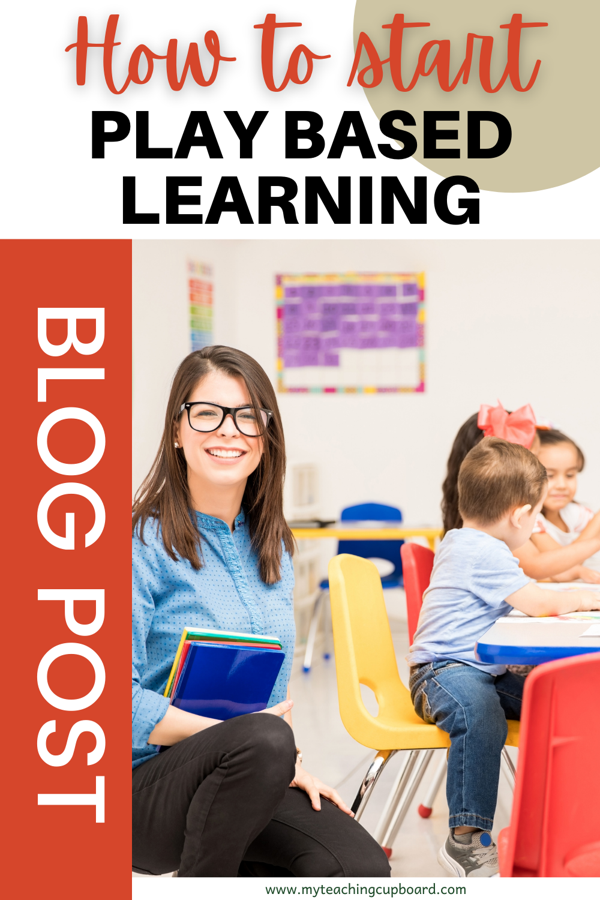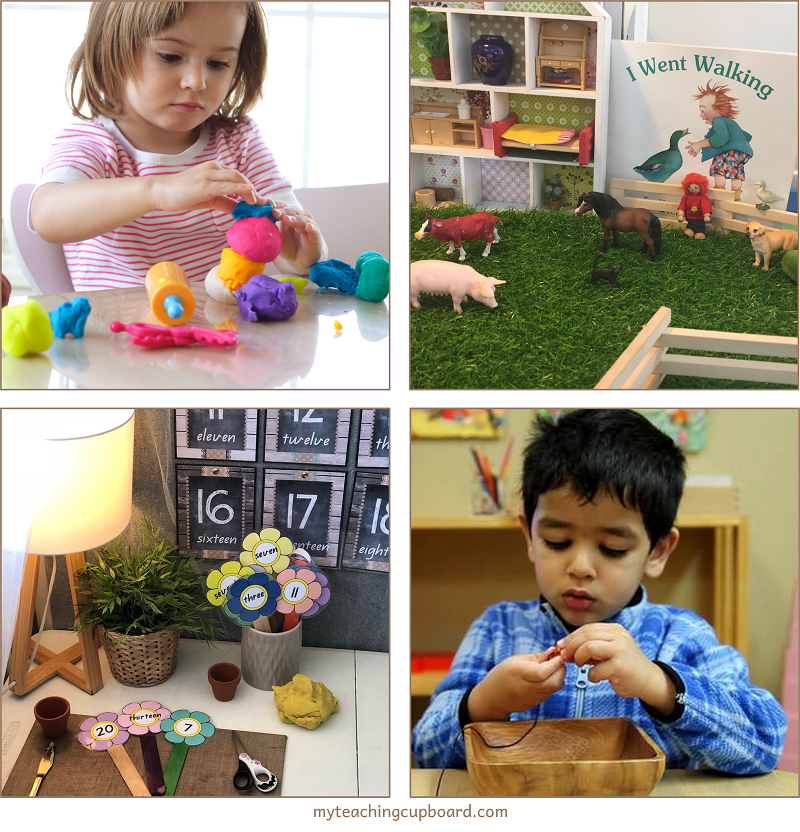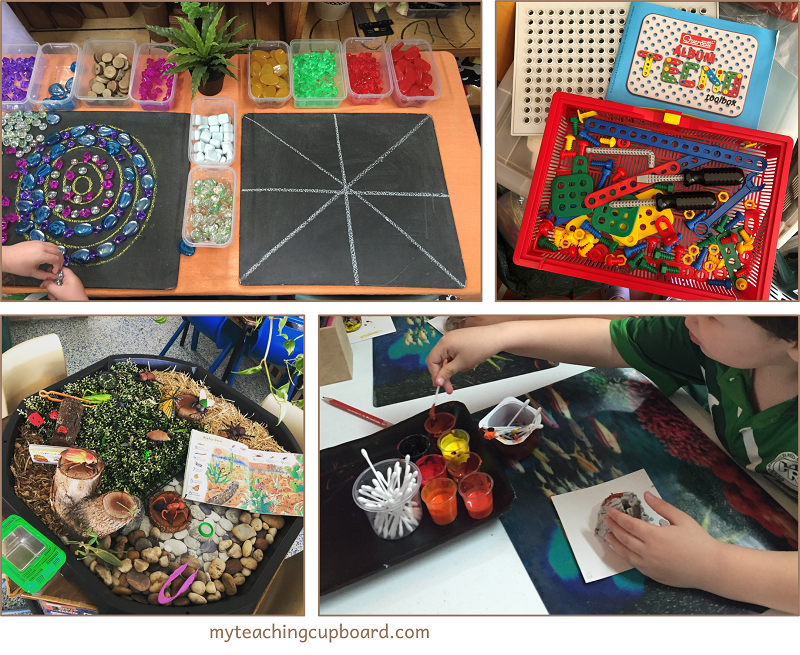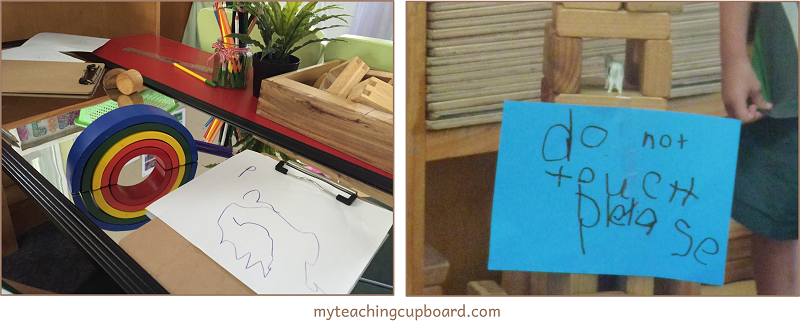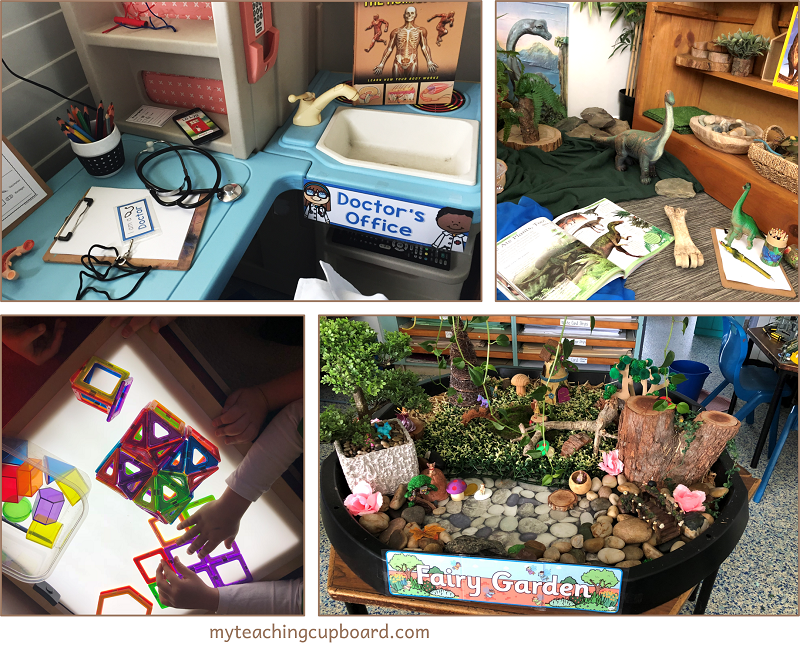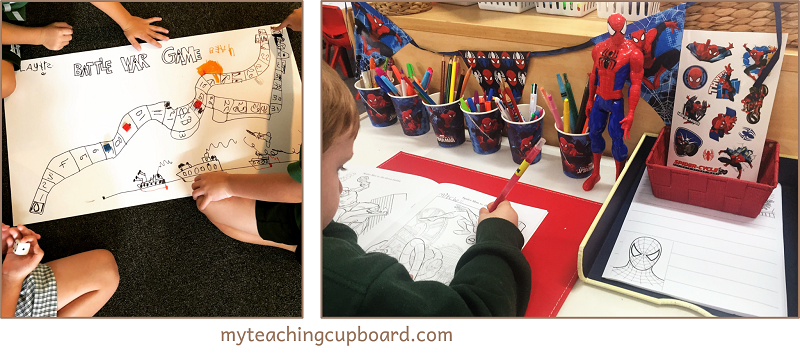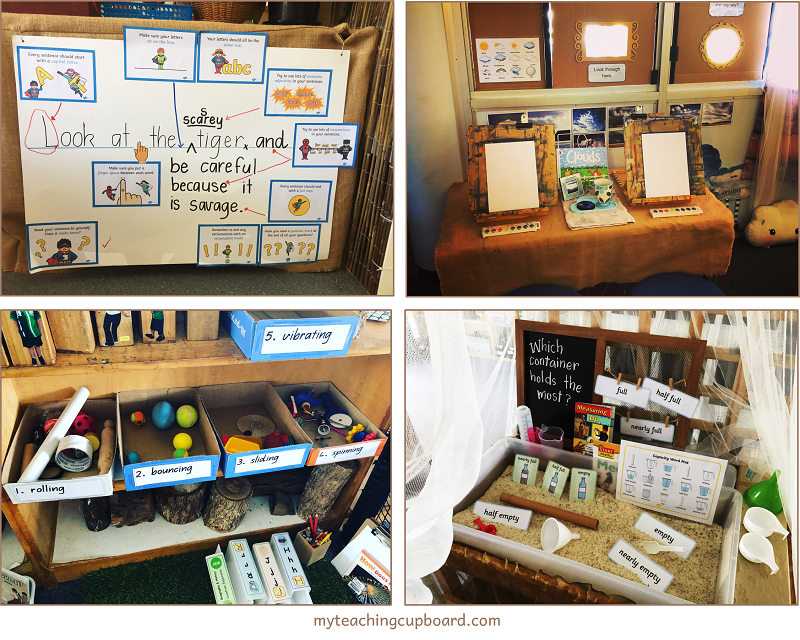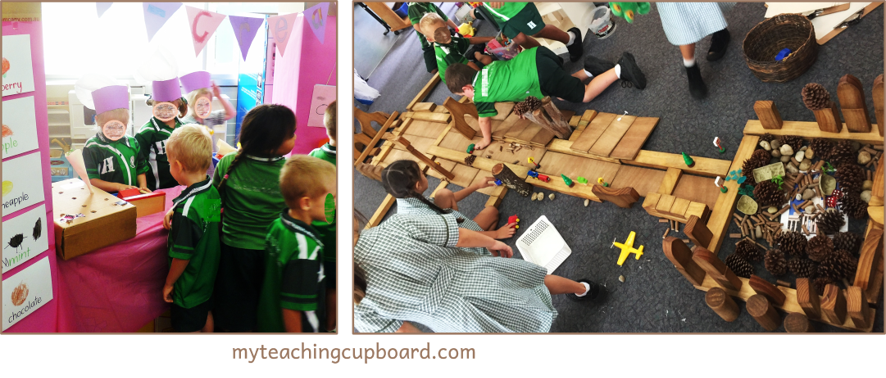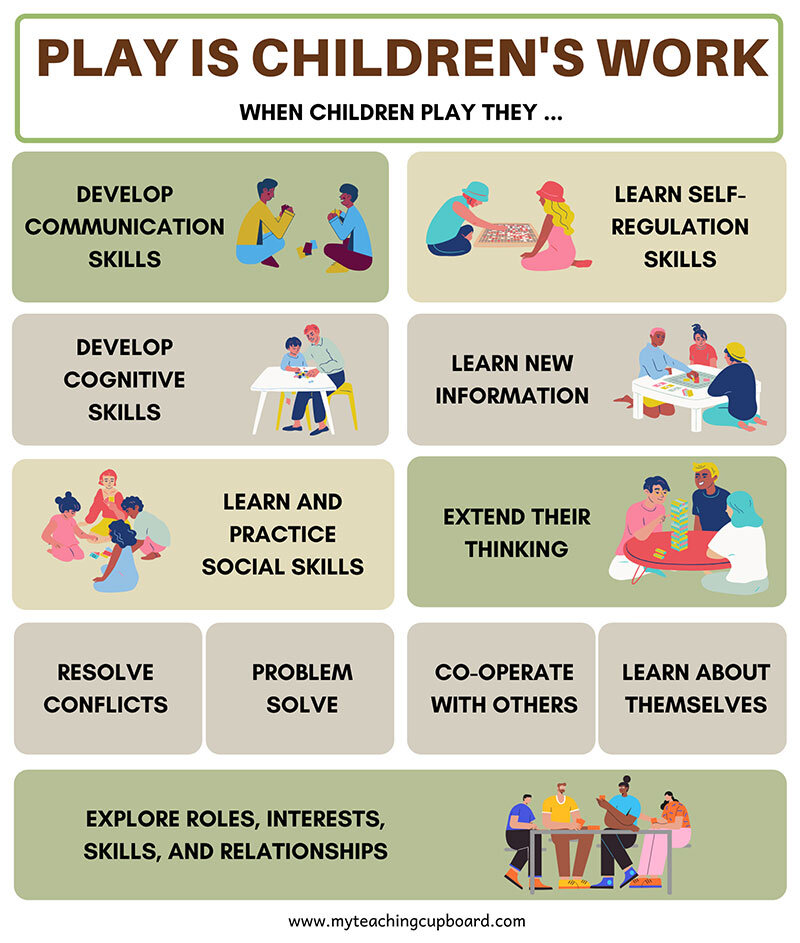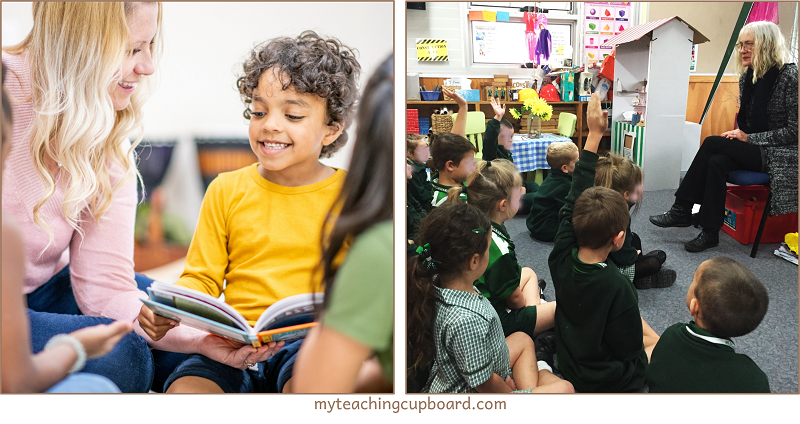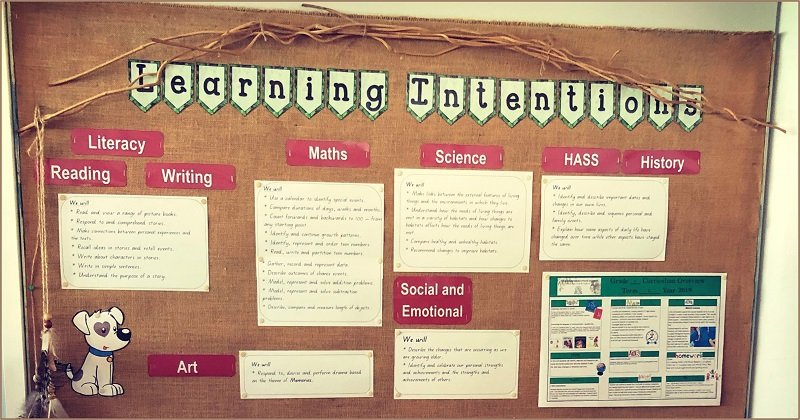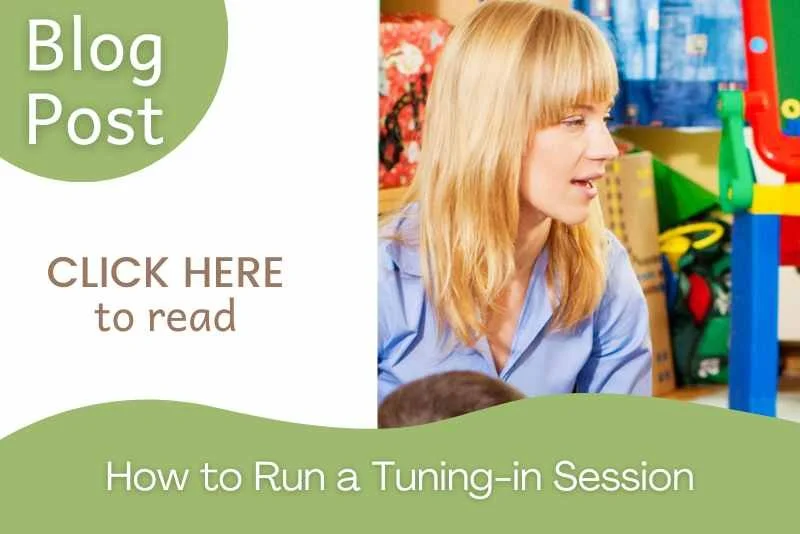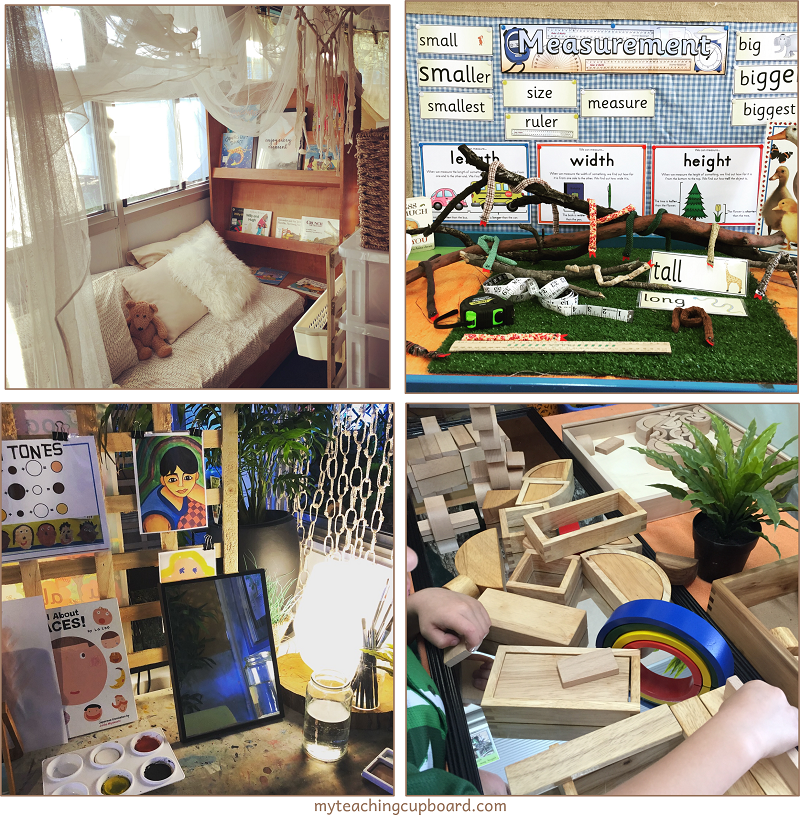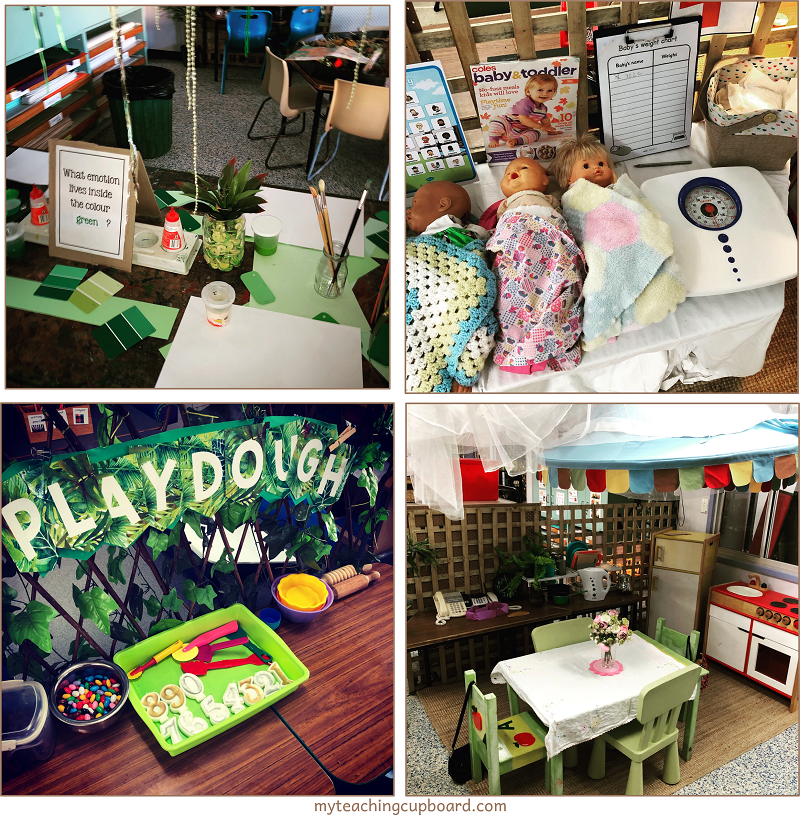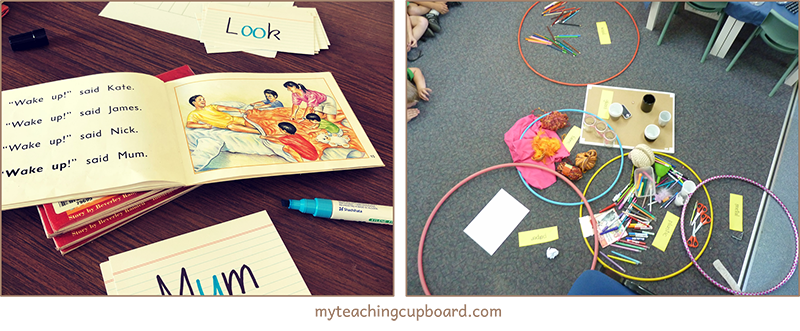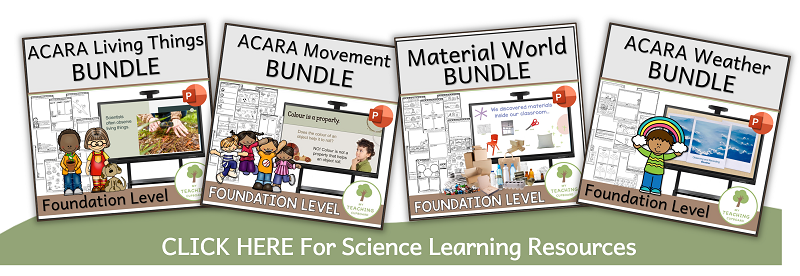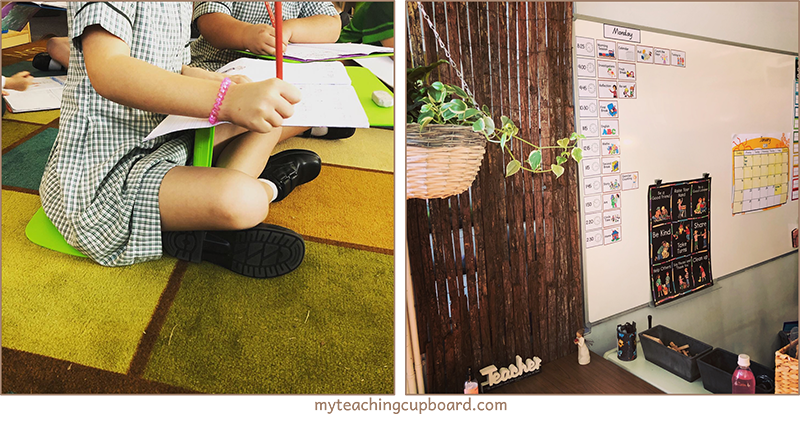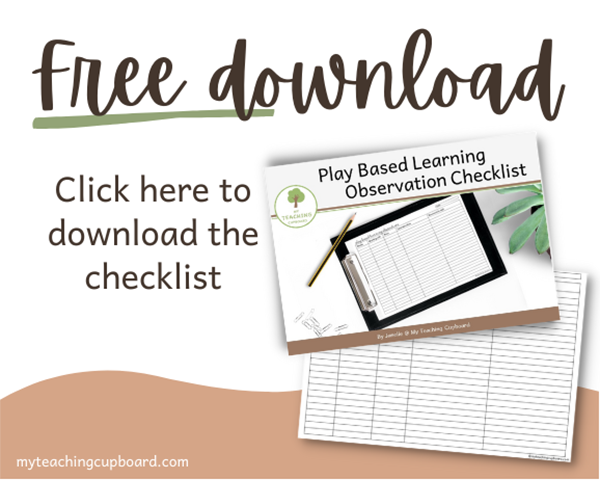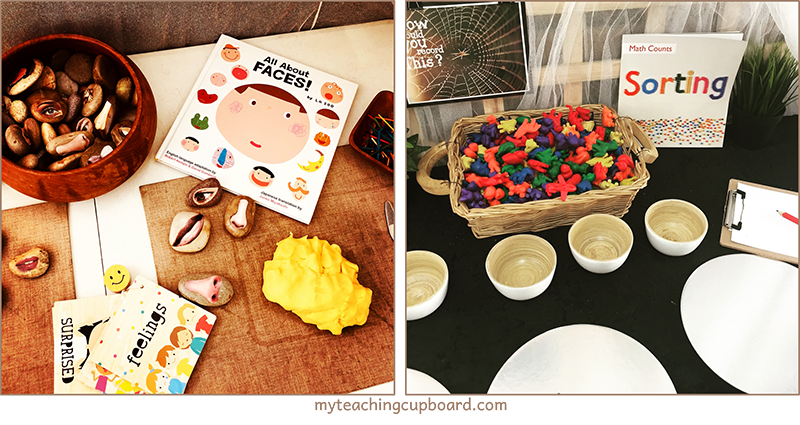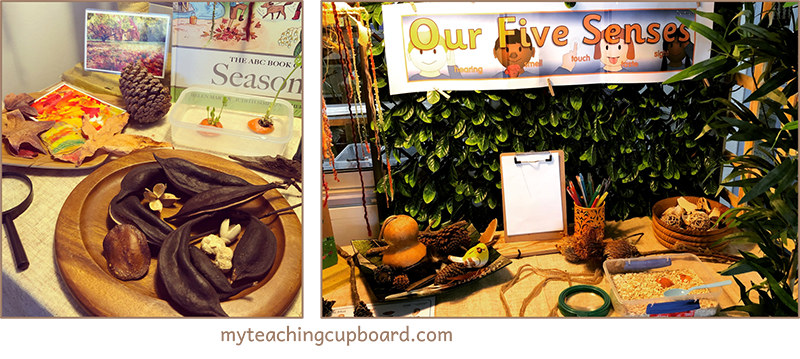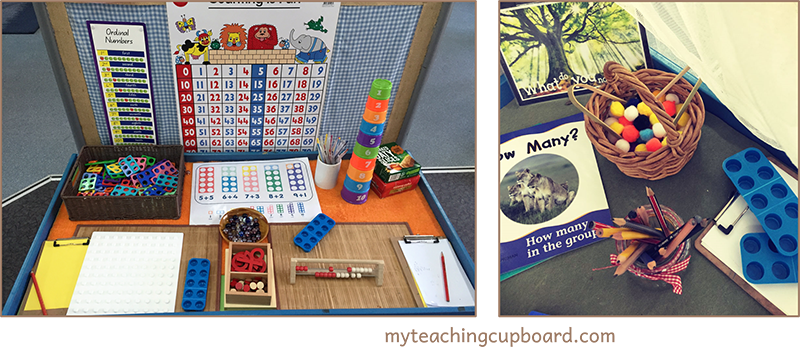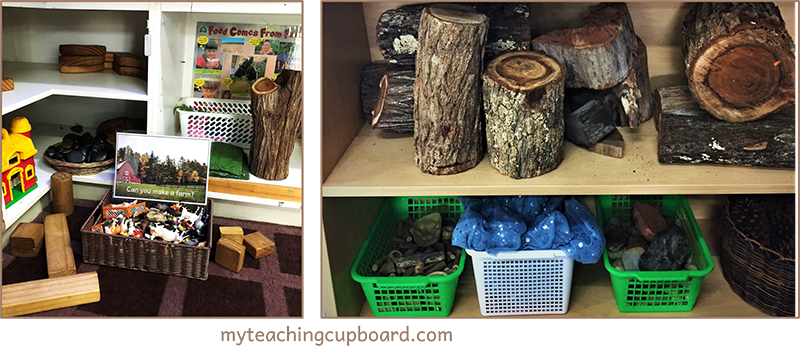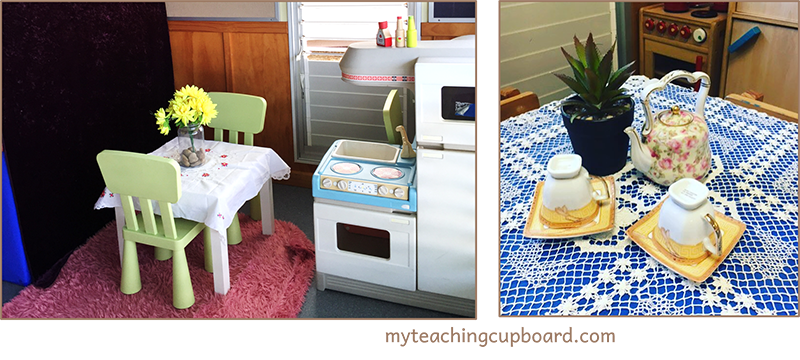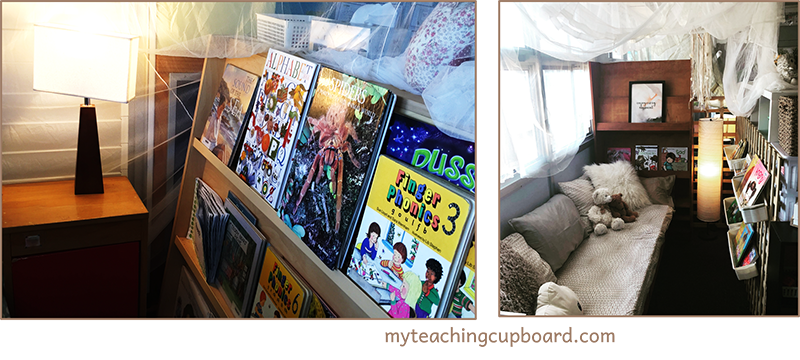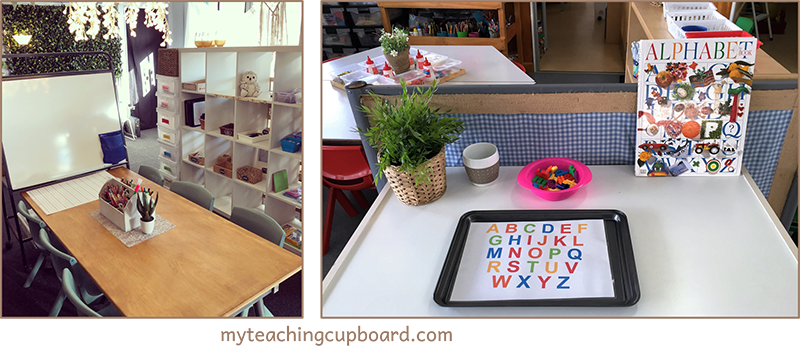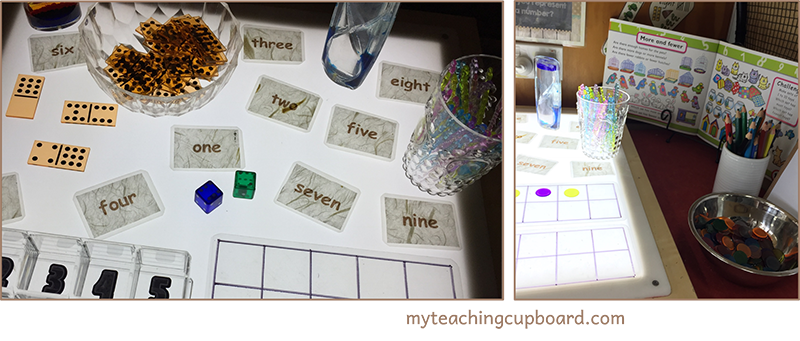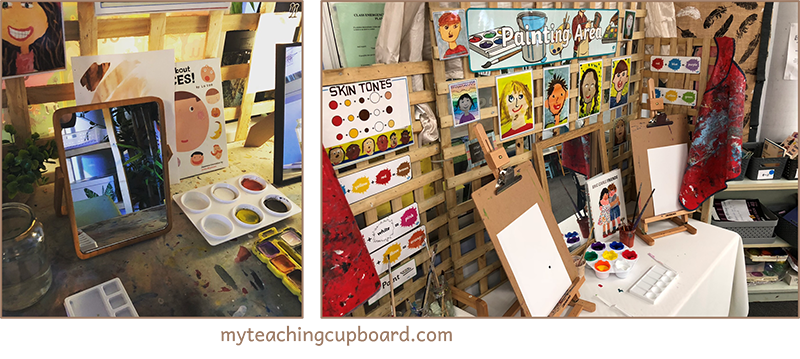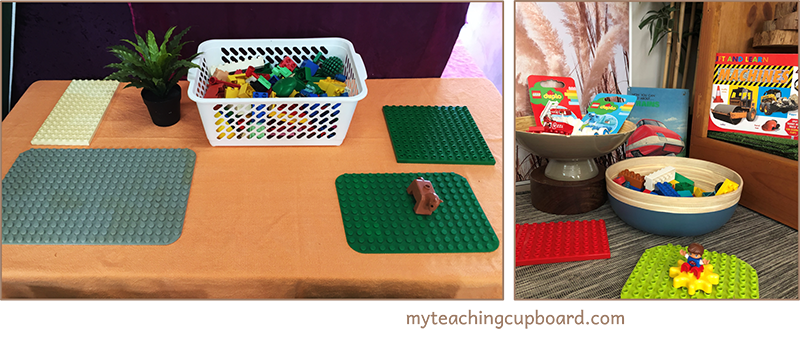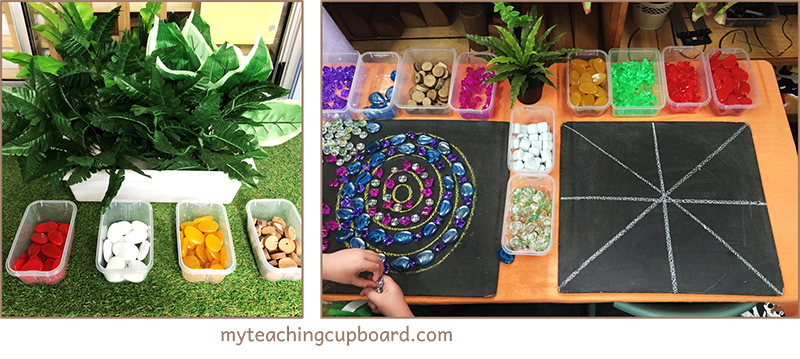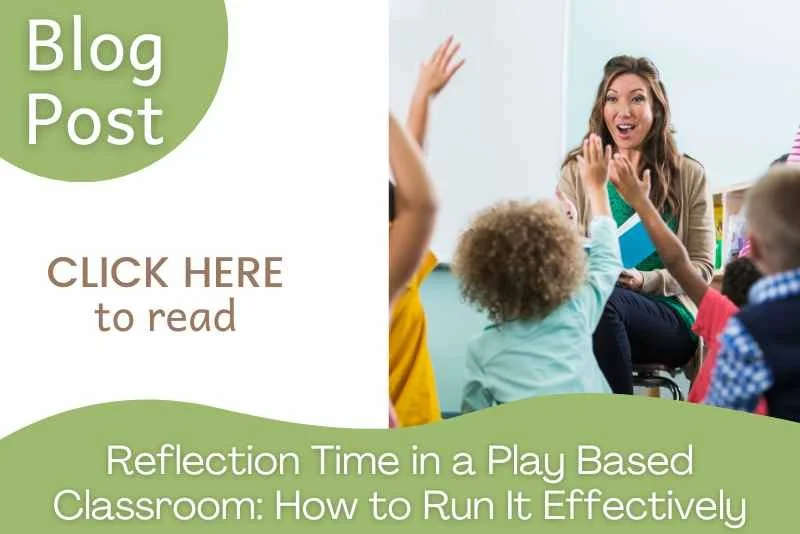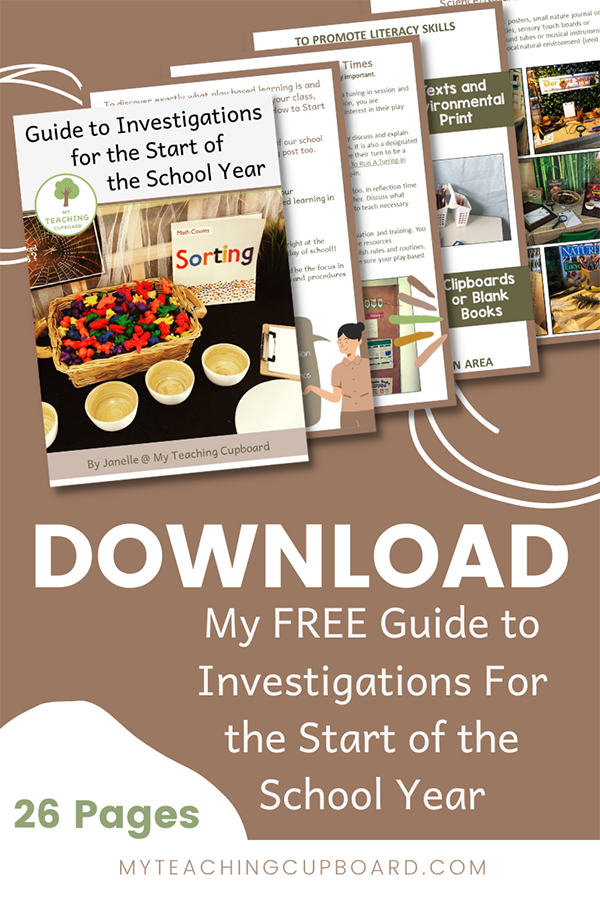How to Start with Play Based Learning
Discover the strategies, tips, and lessons I’ve learned over the past 25 years to make implementing play-based learning simple and manageable. If you want to feel confident knowing how to provide rich, engaging learning experiences to your students that also meet curriculum goals, read on!
Are you interested in play based or inquiry learning but don’t know where to start? Feeling stuck because the idea seems overwhelming? You’re not alone. Many early childhood teachers share this challenge.
In this blog post you will find out all the benefits of play based learning. You will also discover some practical play based learning examples you can use in your classroom and some tips on how you can easily get started with learning through play in your classroom today.
When I first started teaching (many years ago) play based learning in kindergarten was the norm. Our early childhood classrooms were full of engaging hands-on and age-appropriate learning invitations. It was a play based curriculum and was very much child led. Our daily observations informed our planning and our reporting.
Back in the good old days, children were never given a graded report card. A child could not fail preschool. Teachers simply reported their observations and each child’s developmental milestones were accepted and celebrated.
But times changed, and I found myself returning to teaching after raising my own children, only to see play-based learning replaced by more structured, academic-focused approaches. I remember feeling torn: how could I balance curriculum demands with my belief that children learn best through play?
As with most things in our education system, it seems to have gone full circle and play based learning seems to be gaining some momentum – thank goodness!!
There is plenty of research around play-based learning and how it enhances children’s academic and developmental learning outcomes. In fact, the current research has found play based and inquiry learning is vital if you want to set children up for success in both their future schooling and in their later adult life.
In this post, I’ll share the strategies, tips, and lessons I’ve learned to make implementing play-based learning simple and manageable. You’ll feel confident knowing you can provide rich, engaging learning experiences that also meet curriculum goals.
Skills Every Child Will Need to Succeed in 21st century | Dr. Laura A. Jana | TEDxChandigarh
What is Play Based Learning?
Have you heard that play is the work of the child?
Play is not only fun but it has behavioural, social, and psychomotor rewards too.
Play is how children learn about their world. Play and learning go hand-in-hand.
But what exactly is play based learning?
As we all need to meet curriculum standards and benchmarks, play based learning in the classroom cannot just be a free for all type of play. Effective play based learning needs to be thoughtfully planned and executed by the teacher.
Play based learning is a context for learning where children can explore, experiment, discover and solve problems in imaginative and playful ways.
This approach nurtures children’s natural curiosity, promotes active engagement, and provides opportunities for academic learning alongside social development.
It is not just a free for all where children do whatever they like all day. An effective play-based learning approach requires both child-led and teacher-designed learning opportunities.
The teacher supports children’s development by providing investigative learning invitations which aim to foster personalised cognitive and social/emotional growth.
For example, when children are playing with blocks, you can ask questions which encourage problem solving and mathematical skills and concepts. You could add some paper and pens to the blocks so your children will be prompted to draw and write and develop literacy skills.
The resources offered in a play based learning environment have an influence over the type of learning which happens there. Most play based pedagogies suggest the resources you offer should be open ended in nature.
You can read more about how to create and resource educational play environments here:
The Environment as the Third Teacher - If you are interested in transforming your learning environment into a play based space, read this blog post for tips and ideas on how you can do it.
The 10 Essential Areas of a Play-Based Classroom - Ready to transform your classroom for play-based learning? This detailed blog post outlines the 10 essential areas you need to create engaging and educational spaces for your students to learn through play.
As Maria Montessori said, “The goal of early childhood education should be to activate the child’s own natural desire to learn.” This quote perfectly reflects the essence of play-based learning. It’s about inspiring curiosity, not prescribing outcomes.
Play-based learning allows for a blend of spontaneity and structure.
While children may follow their own interests and explore in ways that feel natural to them, the teacher subtly guides this process by creating purposeful play opportunities that align with curriculum goals. It’s in this balance that true learning happens.
Why is Play Based Learning Important?
I’m sure you have heard that children learn through play.
Have you heard that children learn BEST through play? No doubt you know play comes naturally to children and that it is highly engaging but is it really the best way for children to learn?
There are many benefits to play based learning. You should definitely be including this highly engaging and extremely effective form of learning in your school day.
Just like traditional approaches, play-based learning is focused on teaching and learning. Your curriculum goals and benchmarks will still be reached. In fact, the mandated curriculum PLUS so much more can easily be covered.
Through a play-based pedagogy, learning becomes personalised and differentiated, meeting each child where they are developmentally. Children engage in hands-on exploration that naturally strengthens higher-order thinking skills, such as creativity, problem-solving, and critical thinking. This personalised approach helps every child feel successful, fostering a love of learning that lasts a lifetime.
If you adopt a play based learning pedagogy, your children will engage in types of play that reflect their level of cognitive development. Every child will be met with learning opportunities that suit their individual developmental needs.
Engagement is increased in a play based pedagogy too. Play based learning uses a child’s natural curiosity for exploration and discovery. Your children will be highly engaged because their learning experiences become purposeful.
Your children will feel successful and see themselves as learners in a play based learning environment. There is no right or wrong way to learn and work so your children will have no sense of failure.
As each cohort is so different, you will no doubt have children in your class working below and above your curriculum expectations.
You can easily cater for each individual child through play based learning. There is no sense of failure because everyone is working at their developmental level.
Skilled play based teachers are able to design learning environments and investigation areas which are linked to their curriculum learning intentions.
Play based investigation time is a chance for your children to explore, revise and practise the skills they have learned in your explicit teaching lessons.
As an example, you can see how I link the ACARA science curriculum outcomes to our play based learning opportunities HERE in this blog post: Teaching Science in Early Childhood
Academic Benefits of Play Based Learning
Play-based learning provides opportunities for:
Developing cognitive skills, including creativity and problem-solving.
Learning new information and applying it in different ways.
Exploring and revising concepts through purposeful, hands-on activities.
Brain development by supporting cognitive, creative, and critical thinking skills.
Academic success through meaningful activities tailored to each child’s developmental level.
Oral language skills—studies show children in play-based classrooms develop richer vocabularies and improved storytelling abilities compared to traditional classrooms.
If you’re looking for ideas to make your investigations more purposeful, check out my Investigations Store Category for resources to get you started.
Social-Emotional Benefits of Play Based Learning
Play based learning not only provides a chance for your children to learn and practice the mandated academic curriculum learning intentions, but it is also a motivating force for your children to master their social and emotional learning too.
Through play based learning, your children will develop many social skills. Children are consistently communicating, cooperating, sharing and responding to ideas, negotiating, and resolving conflicts.
These interactions foster positive relationships and interpersonal skills, both of which are crucial skills for lifelong learning.
When children have the opportunity to learn through play, they will develop resilience and grow positive attitudes towards learning.
Skills including imagination, curiosity, enthusiasm, and persistence will all be practiced over and over.
Play-based learning also builds essential social-emotional skills, such as:
Practising resilience as they encounter challenges during play.
Cooperating and negotiating roles with peers.
Building communication skills by sharing ideas and working towards a common goal.
As children interact with the environment and the people and resources contained within it, they practise higher-level thinking skills that are essential for the 21st century. These include creativity, problem-solving, analysing, evaluating, and applying their knowledge.
You will observe an increase in the ability of your children to focus and concentrate as they master these skills.
Play is Children’s Work. It is Learning.
Play based learning helps children
develop cognitive skills
learn new information
acquire and practice social skills
develop effective communication skills
learn self-regulation skills
develop the ability to resolve conflicts
work on problem-solving skills
understand how to cooperate with others
learn about themselves and their place in the world
explore roles, interests, skills, and relationships
Another important benefit of a play based learning pedagogy is the amazing growth in oral language you will see. Play based learning research indicates the increased complexity of language and learning processes used by children in play-based programs is linked to important literacy skills. These include understanding the structure of words and the meanings of words.
You might like to check out this investigation into the effect of play-based instruction on the development of play skills and oral language.
This study found children’s vocabulary and ability to tell a story was higher in a play-based classroom than a traditional classroom.
Of course, explicit teaching and direct instruction are still vitally important and very necessary in a play based classroom. It’s all about creating a balance and an integrated method of teaching. Your children will still need explicit teaching lessons.
The research suggests however, that the many benefits of a quality play-based pedagogy means you should definitely be including play based learning in a dedicated part of your school day.
Play based learning is a valuable pedagogy. It is NOT a Friday afternoon reward for good behaviour or an activity set up to occupy your early finishers or even an opportunity to keep your children busy while you administer one-on-one assessments or targeted teaching.
As a teaching strategy—it’s a foundation for developing the whole child, ensuring they are socially, emotionally, and academically prepared for future success.
What Does a Typical School Day Look Like in a Play Based Classroom?
I love visiting other teachers’ classrooms and checking out the way they organise their school day. If you are interested in learning a little about a typical day in my play based classroom, read on…
Morning Session: We all meet on the carpet space for a class morning session or morning meeting. We discuss the calendar and the upcoming day’s timetable.
The children are reminded of their class jobs, we mark the roll and add a counter to our 100 days of school record. Then we discuss the curriculum learning intentions for that school day. These learning intentions will be a focus in the play based learning time (investigations) and in our explicit teaching lessons later in the day.
Tuning – In: After we discuss the learning intentions, we talk to our focus children and finish our tuning-in session with a short discussion of our daily photographer and reporter tasks. If you would like to learn more about our play based tuning-in session and the focus children, reporter and photographer roles, check out this blog post: How To Run A Tuning-in Session
Investigations: Investigation time runs for at least 45 minutes. This is our play based learning time. We have a variety of play based learning activities or learning invitations and learning provocations already set up throughout our room. Most, if not all of the investigation areas and learning invitations are directly related to our curriculum learning intentions.
You can discover how to set up a purposeful learning provocation here: 3 Steps to Setting Up a Learning Provocation
Children choose where they plan to start working during the upcoming investigations session and what they will be working on. This child-led approach ensures that children’s own interests guide their learning, increasing engagement and fostering independence. You can get a detailed picture of our set up in this blog post: The 10 Essential Areas of A Play Based Classroom
Reflection and Re-set: At the end of our investigation time, I call all the children to meet on the carpet again. We don’t tidy up yet. We just get together to discuss the learning that has happened.
This is the perfect time for a short impromptu lesson reflecting something I have observed during the session that I feel would benefit the whole class. It might be a demonstration of a strategy I noticed a child using or a discussion around a social skill we are learning to master.
This focus on social interactions and emotional development helps children learn their role within a group and build a sense of classroom community.
After our reflection, the children are given about 10 minutes to go back to the investigation areas and re-set them ready for investigations the next day.
Explicit Literacy Lesson: We usually have about 30 minutes before first break, so I have timetabled in a quiet activity like independent writing, reading or sometimes math work during this time. This 30 minute timeslot is quite calm and quiet as the children are very settled after their highly interactive investigations session.
This timeslot is also a fantastic opportunity for journal writing, where children can draw and write about their investigations while the experience is still fresh in their minds. Reflection activities like this not only strengthen literacy skills but also help consolidate their learning.
First Break – free play outside
Middle Session: Our middle session is 2 hours long.
We have an hour of teacher directed literacy lessons and activities and then an hour of teacher directed math lessons and activities.
Each hour usually has a 15 minute warm-up or explicit teaching lesson followed by 45 minutes of hands-on activities (group rotations).
This session and the explicit teacher directed lessons and activities are always related to our curriculum learning intentions which we discussed earlier in the morning session.
These explicit lessons and activities also relate to the morning learning invitations the children were working on during their play based investigations time.
Second Break - more free play outside
Last Session: Our last session of the day is only 45 minutes long. This session is usually quite fast paced to help keep the children engaged and on task. We start the session with a short calming down activity and a story. Again, these are linked to our curriculum learning intentions.
Then we have a quick movement break before a teacher directed science lesson. All my science lessons are in the form of highly engaging PowerPoint presentations.
They have been carefully planned to teach ALL the expected ACARA science curriculum content descriptors. You can find out more about these lessons HERE in my store.
To end the day, we often play a quick interactive literacy game or other whole-class activity that brings everyone together before the bell rings. It’s a great way to finish the day on a positive and engaging note.
So much learning happens in our school day and the tight schedule certainly helps our school days to be super productive.
The day goes super quickly!!
If you would like to learn more about my planning, you can download a fully editable timetable for both Prep/Foundation and Year One from my Free Resource Library HERE. These downloads are Microsoft Word documents and are my real timetables from Week 4, Term 1.
How to Introduce Play Based Learning
Now you know what play based learning is, how important it is for the children in your class and how I timetable 45 minutes of play into every one of our school days, you might be interested to discover how you can get started with play based learning and investigations in your classroom.
Here are a few tips and ideas so you can get started learning through play in your classroom today.
Routines and Procedures
Ideally you would want to start play based learning right at the beginning of the school year – yes! On the very first day of school!!
Of course, classroom routines and procedures should be the focus in those first few weeks of back to school. The routines and procedures of your play based investigation times are equally important. To ensure your children meet behaviour expectations and get the most from their investigation sessions, it is very important your play based learning rules and procedures are crystal clear. Your children should understand their roles and what is expected of them.
For example, you could create a visual chart that outlines roles and expectations during investigation time. This helps children understand their responsibilities in an age appropriate, visual and engaging way.
Teacher Observations
The primary role of the teacher in any play based classroom is that of observer. During play based learning you can really get to know your children and what their interests and developmental needs are.
Take the opportunity to make observations of each child. Note who they are working with, what they are doing, where they choose to work and for how long. Make notes about possible future resources and learning invitations which will suit the individual needs of your children. Use your observations to inform your lesson planning and assessments.
Remember: These observations don’t just help you plan—they also help you document and celebrate each child’s progress.
You might like to use my observation checklist. This is the one I use for the first couple of weeks at the start of every school year. You can download it for FREE here.
Only Basic Resources – LESS IS MORE!
Start the year with simple, open ended learning invitations. Open ended resources (like loose parts) are always age appropriate. They are the best type of resource because every child, no matter their developmental level, can purposefully and successfully work with open ended materials.
You can find out all about these wonderful open ended resources and download a FREE list here on this blog post: Loose Parts Resources
Hot Tip: Keep it simple at the start of the year. Offer only a few resources at each investigation area. Start with familiar materials like blocks, stones, or coloured scarves. As you observe the children’s interests, gradually introduce new materials to keep engagement high.
You want your investigations to be very quick and easy to reset. Use those first couple of weeks to observe the way the children interact with the resources and then use these observations to decide on which new resources you will offer.
Let Your Observations Guide You
As the year progresses, you will learn more and more about your children and about play based learning as a pedagogy. Your growing knowledge will be reflected in your learning invitations and you will notice them becoming increasingly more complex.
Let your children and your observations guide you. This approach not only makes your job easier but also ensures that your classroom remains a dynamic and engaging learning environment.
Simplify your start to the year with my Free Guide to Play-Based Investigations. This resource includes practical tips and tools to help you hit the ground running.
Play Based Learning Invitations to Start the Year
Starting the school year with engaging and purposeful play-based learning invitations is the key to a successful play-based classroom. Carefully planned invitations not only spark curiosity and exploration but also set the tone for how your children will interact with their learning environment.
Here are examples of learning invitations I set up in my classroom for the first few weeks of school:
Science/Nature table: 5 senses text, small nature journal, smelling sachets, touch boards, feely box, eye mask, sound tubes, small basket of items from nature (seed pods, shells, feathers)
Add a magnifying glass and a set of observation questions, such as “What do you notice?” or “What patterns can you see?” to encourage closer inspection and discussion.
Maths: Counting text, finger and counting rhymes on cards, number poster, Calendar, wooden numerals, small selection of concrete objects (counters, teddy bears, bundling sticks, unifix), board game, dice, numbered cups.
Include task cards with challenges like “Can you make a pattern with the counters?” or “Roll the dice and count out the matching number of teddies.” These prompts add intentionality to your maths area.
Blocks Area: text about animals & living things, big wooden blocks, basket of wooden people, basket of animals, small fake grass squares, a few small pieces of fabric, pinecones, big wooden dice.
Add a small STEAM provocation card that says, “Can you build a home for the animals?” or “How tall can you build a tower that stays balanced?” to inspire creative construction.
Sensory Playdough: playdough, face parts story stones - eyes, lips, nose, feelings text and posters, rolling pin, safety knives, placemats.
Add a set of printable playdough mats with loose parts for making faces, patterns, or letters. This adds a literacy or fine motor focus to the sensory play.
Activities here strengthen fine motor skills and hand-eye coordination while supporting social-emotional learning as children express feelings through creative play.
Art Collage - scissors, glue, paper shapes, paddle pop sticks, wool, cotton wool, a couple of magazines, small selection of coloured and plain paper.
Include a visual prompt, such as a photo or painting of abstract art, to inspire creativity and give children a point of reference for their own work.
There are some great books to inspire creativity and experimentation in this area too. You can check out my top 5 here in this blog post: 5 Picture Books for Your Classroom Maker Space
Dramatic Play Home corner – a couple of texts about families, play kitchen, cutlery, plates & saucepans, small table & chairs, toy food, telephone and telephone numbers, play clock, vase of flowers, cookbook, tablecloth, play fridge, shelf.
Add a simple recipe card for children to “cook” with or a pretend shopping list for a trip to the toy store. These additions encourage literacy and role-playing.
Role-play in dramatic play areas fosters pretend play, social interactions, and language development. These areas are also ideal for exploring themes related to a child’s development, such as family roles and relationships.
Dramatic Play Doll house - a couple of texts about families, doll house furniture, dolls.
Reading Area: A selection of about 20 picture books related to starting school, the 5 senses, counting, shapes & numbers, living things, families, friends & feelings.
Add a comfortable rug or cushions to make the space inviting. Label the bookshelves with categories like “Our World” or “Feelings” to encourage exploration.
I have written a whole blog post on how I set up the most engaging reading area in my classroom here: Cozy Classroom Reading Area Ideas Students Will Love
Writing Table – picture dictionaries, selection of plain and lined paper, pencils, crayons, magnetic letters, small magnetic whiteboards.
Most children will be making marks and drawing at the start of the year but you might like to try including some blank speech bubble cutouts to encourage children to write what their toys or animals might say during play. This is a great way to integrate writing into imaginative play.
Light Table – text about patterns, small selection of transparent loose parts in a divided tray (gems, counters, numbers & dominoes), sorting dishes or cups.
Add a set of translucent coloured shapes with a challenge like “Can you make a pattern?” or “Can you build a rainbow?”
Art Painting— texts and posters about feelings, acrylic mirror, watercolour paint palette, selection of different sized brushes, water bottle, black marker.
Include a small sign that says, “How do you feel today? Paint your emotions.” This ties emotional expression to artistic creativity. You can download the exact set I use here: Feelings and Emotions Display Cards
Tinkering— duplo.
I love Duplo. It’s quick and easy for the start of the year but another great option would be traditional tinkering materials. Consider adding some simple tools like child-safe screwdrivers and nuts/bolts for children to experiment with assembling and disassembling.
Loose parts - texts about faces and feelings, empty picture frames - a small selection of a few of each: wooden circle rings, corks, coloured wool pieces, buttons, wooden discs, stones, fabric scraps OR loose parts with pattern mats and sorting bowls.
Add pattern mats and sorting bowls for sorting or creating designs with loose parts. Download these resources from my Loose Parts Store Category.
CLICK HERE TO DOWNLOAD my play-based learning pdf to print out the detailed guide and examples of play based learning invitations you can use for starting the school year.
Don’t Skip Tuning-in & Reflection
These components of a play based program are very important.
When you discuss the learning that is expected during a tuning-in session and the learning that has happened during a reflection session, you are demonstrating to your children that you have taken an interest in their play and that investigations are valuable learning times.
A tuning-in session is an opportunity for you to explicitly discuss and explain the class learning intentions and behaviour expectations. It is also a designated time for you to learn more about each child as they have their turn to be a focus child. If you want to learn more about it, make sure to check out this blog post: How To Run A Tuning-in Session
A reflection session is an optimal teaching opportunity. We never miss this chance to discuss learning, expectations and reflect together. Discuss what worked well and what needs to improve. Use this time to teach necessary routines and skills.
Reflection and Continuous Improvement
Reflection sessions are one of the most important elements of a successful play-based classroom. They provide a structured opportunity for students and teachers to pause, look back on what has been learned, and plan for future growth. These sessions aren’t just about tidying up or resetting - they’re about making learning visible and meaningful.
The Importance of Reflection Sessions
At the end of investigations, I bring the children together on the carpet for a short reflection session every single time. This time allows us to:
Discuss the learning that has happened during play.
Share strategies, successes, and challenges.
Reinforce key social and academic skills.
Reflection deepens the learning process. It helps children see that their play is valued and connected to their personal and academic growth.
For teachers, it’s an opportunity to gain insight on any quick adjustments that need to be made to any of our investigation areas or plan possible new provocations based on observations.
An Example in Action
During one investigation session, I noticed a group of children working together to build a tower in the blocks area. They encountered some challenges keeping the structure stable, but instead of giving up, they started brainstorming solutions and taking turns adding pieces.
In our reflection session, I shared this example with the class and asked:
“What did you notice about how they worked together?”
“What strategies did they use to solve their problem?”
“How can we use these same strategies in other areas?”
This impromptu discussion became a lesson in collaboration, resilience, and critical thinking, reinforcing the importance of working together and persevering through challenges - the perfect lesson for at the start of the school year!
The Evolving Nature of Play-Based Learning
Play-based learning isn’t static. As the school year progresses, it evolves alongside your students’ interests, skills, and developmental needs. You’ll grow too, becoming more confident in balancing the demands of the curriculum with the dynamic, exploratory nature of play.
Here’s how reflection drives continuous improvement:
For students: Reflection helps them develop metacognitive skills, or “thinking about their thinking.” They begin to recognise their strengths and identify areas where they can improve.
For teachers: Reflection helps you identify what’s working, what’s not, and what could be adjusted. It’s an ongoing cycle of observation, planning, and refinement.
By embedding regular reflection into your routine, you create a classroom culture of curiosity, collaboration, and growth. It really is the secret to a successful play based pedagogy!
To find out more about why reflection time is a vital part of any well-run play-based classroom and learn how to effectively implement the successful Walker Learning reflection strategies (the ones that help you connect play with curriculum and support student growth), check out this blog post: How to Run Reflection Time in a Play Based Classroom to see how I run our reflection session and why it is so so so important.
Investigations in the first few weeks are all about observation and training. You will probably need to teach your children how to use the resources respectfully, how to interact with each other, and establish rules and routines. Taking the time to establish these now will help to make sure your play based learning sessions will run smoothly in the future.
How to get into Play-Based Learning: Part 1 - What is Play?
Overcoming Challenges in Play Based Learning
There are common challenges teachers face when they start implementing play based learning. I’m here to help you so if you have any questions - please feel free to contact me here or on Instagram.
Here are a few common questions I often get asked:
What if my children are wasting time?
In a play based pedagogy no child is going to be wasting learning time. No child will be interested in doing work below their developmental level. That would be boring!!
Your children will naturally extend themselves. They cannot help but learn through their natural curiosity and play.
Remember… The goal of early childhood education should be to activate the child’s own natural desire to learn. (Maria Montessori)
What should I be teaching at investigation time?
Your role is to observe your students. Discover their interests, their academic and social/emotional needs and to then use this information to provide more play based learning invitations specifically designed for the children in your class.
As you become more skilled and begin to trust the process, you will find yourself using your observations to help you effectively differentiate your explicit teaching lessons and further inform your planning and assessments.
How do I find time for play-based learning?
Balancing play-based learning with other classroom demands can feel overwhelming. The key is to integrate investigations with explicit teaching and use structured timetables.
Here’s what works for me:
Schedule dedicated time for investigations, as outlined in my Weekly Timetable for My Play-Based Classroom.
Use the tuning-in session to introduce learning intentions that children can explore during investigations.
Incorporate reflection sessions to link what children have explored through play with your curriculum goals.
By embedding play-based learning into your daily routine, you’ll find that it complements explicit teaching rather than competing with it.
How do I ensure curriculum coverage?
One of the biggest concerns teachers have is ensuring that play-based learning aligns with the curriculum. The solution lies in linking learning invitations directly to your curriculum goals.
For example:
Use illustrated learning intentions to visually communicate curriculum goals to your students.
Design learning invitations that reflect specific curriculum outcomes. For instance, a maths invitation might involve sorting and counting objects, while a science invitation could focus on observing natural materials like seed pods or feathers.
Remember: With play-based learning, your curriculum goals are met naturally as children engage with carefully chosen resources and invitations.
Simplify your planning process and save yourself hours of time with my Illustrated Learning Intentions. This done-for-you pack ensures your curriculum objectives are clear and engaging for your students.
By addressing these challenges head-on, you can confidently implement play-based learning without feeling like you’re sacrificing valuable teaching time or curriculum alignment. Trust the process, and you’ll see the rewards in your students’ engagement, growth, and love of learning.
Once you start your play based learning journey, I know you and your children will find it so rewarding.
Throughout this post, we’ve explored what play-based learning is, the many benefits it offers, and how to successfully implement it in your classroom.
You’ve learned practical strategies like setting up learning invitations, balancing explicit teaching with investigations, and using observation to inform your planning and differentiation.
By focusing on routines, starting with simple resources, and embracing reflection sessions, you can create a thriving play-based classroom that meets both developmental and curriculum goals.
Play-based learning may feel overwhelming at first, but with the right tools, mindset, and support, it’s achievable and impactful. This amazing way to teach and learn is all about a play-based curriculum that nurtures children’s natural curiosity, lifelong learning, and the development of crucial skills they’ll carry into the future.
Your children will be more engaged, independent, and excited to learn, and you’ll rediscover the joy of teaching in a way that feels natural and meaningful.
Ready to take the next step?
Join my email list and download your FREE Play-Based Learning Observation Checklist—an invaluable tool for observing and documenting your students’ progress.
Explore my Investigations Store Category for resources designed to help you integrate play-based learning into your classroom with ease.
Stay in touch and let me know how you are going!!
I am always looking for ways I can promote play based learning and help teachers like you on your journey.
If you liked this blog post on how to start with play based learning, please consider sharing it so other teachers can start this journey too...
Just CLICK the sharing box below.👇

